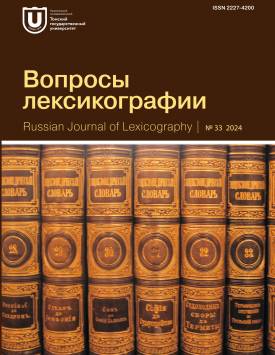“Dictionary of the Russian Language of the 18th Century” as a tool for studying the individual authorial style
The article examines the problem of the connection between the authorial dictionary and the historical dictionary in the context of studying the language and style of writers. The material for the study is illustrations from the works of Feofan Prokopovich, presented in the academic Dictionary of the Russian Language of the 18th Century, which covers the processes of formation of lexical and grammatical norms of the Russian literary language of the corresponding time period. The importance of studying Feofan Prokopovich’s literary work in the context of linguistic evolution and the history of the formation of lexical and grammatical norms of the Russian literary language of the time is determined. In particular, the specificity of Feofan Prokopovich’s style and the lexical thesaurus of his works is of great importance for understanding linguistic trends and the development of the literary language in the Petrine era and the post-Petrine period. The research methods are lexicographic (analysis of dictionary data), diachronic (study of language changes over time), interpretive (analysis of the meanings and uses of words), and comparative (comparison of various linguistic elements and phenomena). The author also uses a methodology related to the study of the “Western Russian (written) language” and individual works in this language. In the course of the study, the following conclusions were obtained. Feofan Prokopovich used a variety of thematic groups in his writings, covering ancient mythology, religious themes, moral and ethical issues, science, art, military affairs and political geography. Such a variety of vocabulary reflects the important role of Prokopovich not only as a writer, theologian and politician, but also as a person who shapes the new civil discourse of his time and the artistic speech of the Baroque and pre-classical era. The author of the article made a significant contribution to solving the problem posed, using the academic Dictionary of the Russian Language of the 18th Century to analyze the lexical and stylistic palette of the works of Feofan Prokopovich. A detailed analysis of words belonging to various groups was carried out. The importance of the Old Slavonic lexical element in Prokopovich’s works was emphasized. New speech trends and elements that influenced his book and written style were identified. Particular attention was paid to the variety of figurative words and phraseological expressions Prokopovich used, based on specific examples from the historical dictionary. Further analysis will allow us to better understand the features of the terminology Feofan Prokopovich used, as well as the influence of various linguistic and cultural factors on his works, which requires content analysis of the texts created by the writer-reformer and the creation of Feofan Prokopovich’s authorial dictionary. The author declares no conflicts of interests.
Keywords
lexicography, historical dictionary, authorial dictionary, writer’s dictionary, lexical level of text, diachronic rhetoricAuthors
| Name | Organization | |
| Patroeva Natal’ia V. | Petrozavodsk State University | nvpatr@list.ru |
References

“Dictionary of the Russian Language of the 18th Century” as a tool for studying the individual authorial style | Voprosy leksikografii – Russian Journal of Lexicography. 2024. № 33. DOI: 10.17223/22274200/33/5
